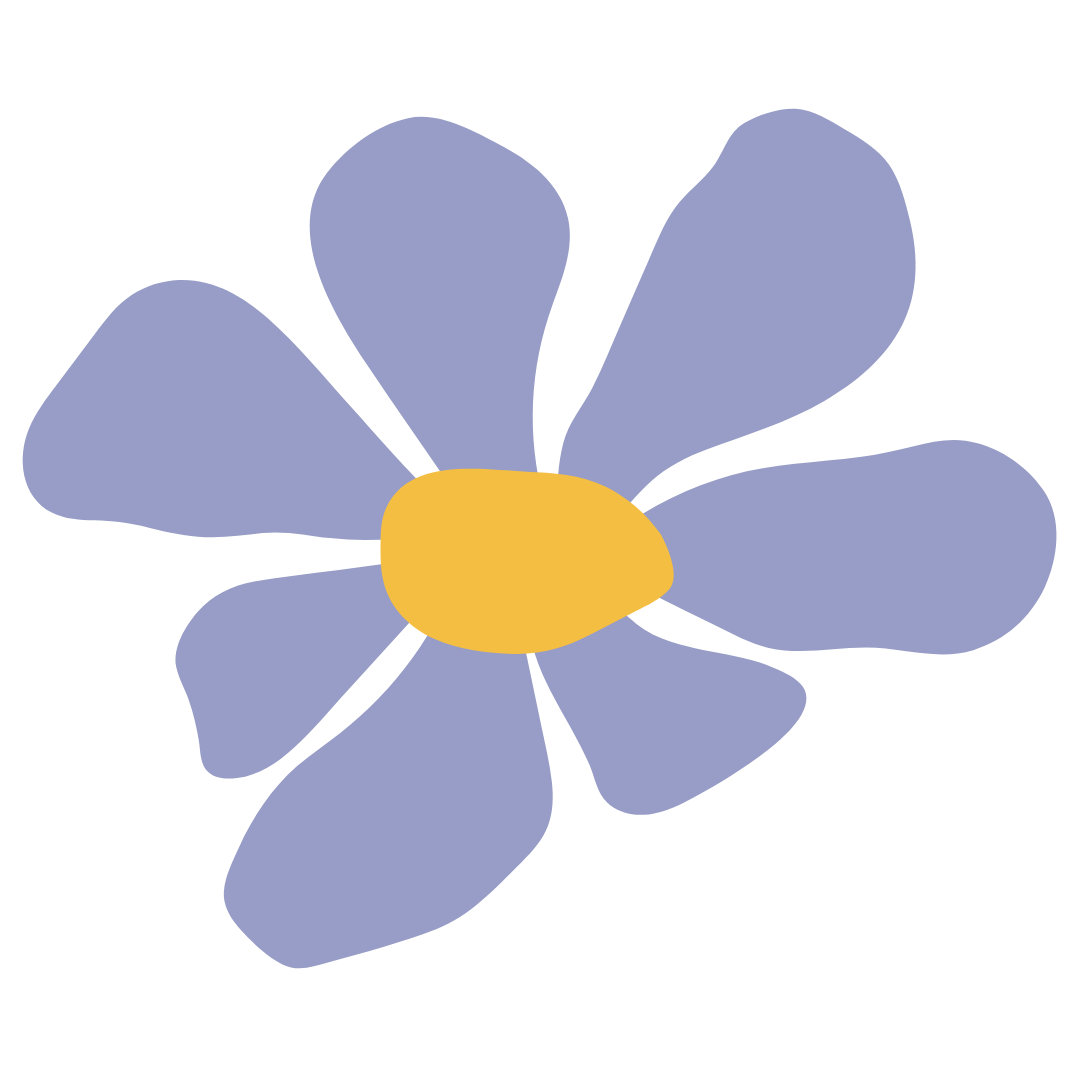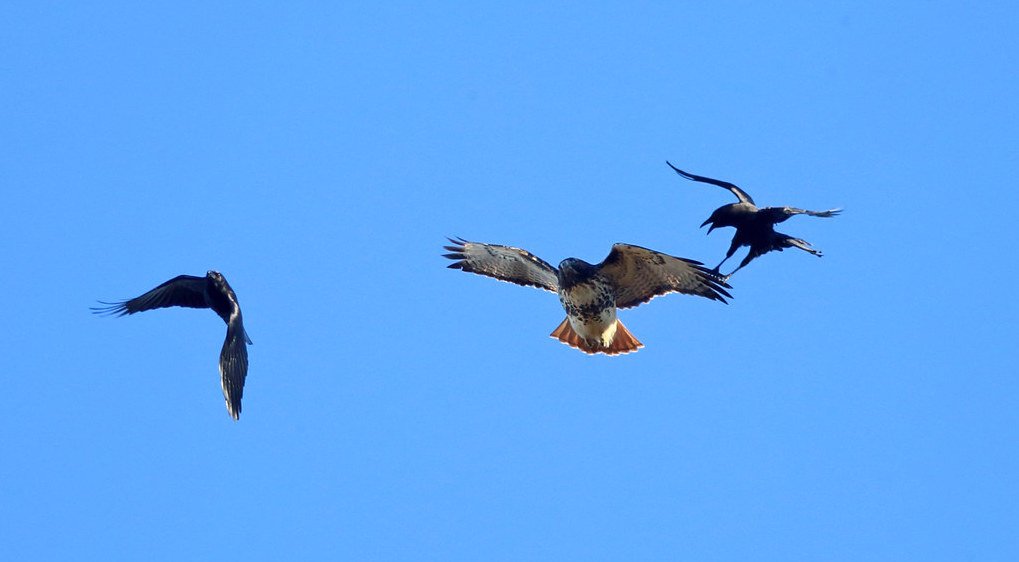Real Life Magic: The Hidden Worlds Around Us
Let me tell you a story. It began back in August, when I started reading the literature for my Kripalu Mindful Outdoor Guide training. One of the books that I read first was “What the Robin Knows” by Jon Young. Here I learned so much about bird behavior, like how crows “mob” larger birds like hawks. Crows don't want the hawk around their territory and especially their nests. So when they spot a hawk, one or more crows will give chase, cawing fiercely and flying close to the hawk, even swooping in to peck and ruffle the hawk’s feathers to try and get the hawk to leave the area.
Crows mobbing a red-tailed hawk. Photo © Tom Murray /Flickr
I learned about that behavior, and suddenly, one Sunday morning while I was out on a walk, I got to see it in action. The cawing of crows making a fuss drew my attention, and when I looked up, I followed the sound of crows to a sighting of a hawk who perched in a nearby tree.
My curiosity led me closer, and I ended up spending the morning tracking not one, but two hawks. As I followed their movements from one tall tree to another, I became familiar with their call – the particular voice that I was able to later identify as a red-shouldered hawk - and I began to see which tall cypresses, pines, and eucalyptus trees they frequented.
After that morning, I started seeing or hearing a hawk or two almost every day. I hear hawks calling when I am inside my apartment or eating outdoors at a restaurant. I see hawks flying or perched in trees when I’m driving down the road. In the 7-plus years that I’ve lived in this neighborhood, I probably saw a hawk once or twice… and now, suddenly, they are all around!
What in the world is happening here? Are there more hawks? Did they just move to the area? I don't think so. The change is not on the part of the hawks, but in me, and what I do with my attention.
Before, I wasn't making much of an effort to pay attention. I didn’t know about crow and hawk behavior, so hearing cawing crows didn't spark my curiosity, but rather sometimes my annoyance at their “noise.” I didn’t know the sound that a red-shouldered hawk makes, and since I didn't associate that sound with anything, I didn’t even register hearing it. And I realize now that when I was walking around my neighborhood, I was looking at eye level, not up into the trees or the sky.
Curiosity led me to read and learn. Learning led me to be open to a new experience. Experience taught me what to listen for and where to look.
These days, when I go outside, my first look is toward the eucalyptus tree branch that’s a regular hawk-hangout. These days I pay attention to a crowd of cawing crows the way I’d pay attention to a group of people holding signs on the street corner – “I wonder what is happening over there? Let’s find out!” This repeated listening and looking brings me hawk sightings…and hawk sightings bring me wonder and delight!
From my perspective, it’s as if for seven years, there were no hawks in my neighborhood, and suddenly they’re everywhere.
Though it’s hard to explain exactly why, there is deep joy and satisfaction in this new and intimate knowing of the world outside my door. There is a sense of connection and belonging in my familiarity with my hawk neighbors: “There is Red-Shouldered Hawk. They like to sit on the high branch of a eucalyptus tree, until the crows chase them away. Here is Katie. She likes to walk around the trees and sit on that bench with her binoculars until her schedule chases her inside.”
What We Pay Attention to Determines What We See
I have other stories like this, like when I noticed a patch of delicious blackberries that I had walked by without seeing for years. Or recently, when I was puzzling over a problem and couldn’t find a solution. I would think about it and just hit a wall of impossibility. One day, I had gone out for a walk, and I ended up sitting in a clearing for a while, just enjoying the light in the trees. As soon as I stood up and continued on my walk, I had an idea that suddenly illuminated a fully-detailed possibility for what I had been stumped by. It stunned me! Relaxing my mind, enjoying the outdoors, and giving myself open space invited something new to come forth.
Richard Louv wrote, “nature simultaneously calms and focuses the mind, and at the same time offers a state that transcends relaxation, allowing the mind to detect patterns that it would otherwise miss.” In all of these stories, I experienced something “new” that apparently was there all along, but I wasn't privy to. To me, this is basically a real-life experience of magic — Abracadabra: Hawks! Blackberries! A solution to my problem! What a gift to “see” something that was invisible before, whether in the world outside or within my own brain and heart.
In his book, “Rewilding,” Micah Mortali (one of my teachers, and founder of the Kripalu School of Mindful Outdoor Leadership) writes “The consciousness we bring to anything is the single most powerful determinant of our experience.” What we pay attention to determines our reality. This means that there are whole other hidden levels at which we can be experiencing our world… if we want to, and if we bring the ingredients of curiosity, presence, and awakened senses.
There is a thrill of discovery here because… we don’t know what we don’t know! If we are not paying attention to something, it’s as if it doesn’t exist at all for us. Which makes me even more curious: Who else is in my neighborhood that is invisible to me? What else is in my everyday world that I have no idea about? What is going on all around me that might affect my life in positive ways, if I only saw it?
But how can we notice what is under (or above!) our radar? How do we come out of our fog, out of our captivating thoughts, so that we don’t miss the magical moments altogether?
If we have become disconnected from the natural world, we may be suffering (without knowing it) from the “diminished use of the senses” that Richard Louv describes as being part of Nature Deficit Disorder – our senses may be dimmed so that we are noticing less. When we take time to consciously invite our senses to come online, we notice more, the invisible becomes visible, and our life is richer for it.
And when I say “our life is richer,” I’m not just talking about seeing hawks and blackberries. It’s important to note that activating our senses outdoors doesn’t stop there. We don’t selectively awaken – this new awareness, developed and practiced outdoors, will automatically come into other ways of being in the built world and in our human relationships. So instead of seeing blackberries, you may be more aware of the look on your friend’s face that tells you she’s struggling and needs your attention, for example.
An invitation: Build the habits of paying attention, of pausing, of going slowly, so that you can give yourself time to experience and notice. Open your senses consciously – listen and look and smell and touch. It will take more energy, at first, to move through the outdoors in this way… and then your world will change as if by magic.
You Don’t Have to Do This Alone
If you’re anything like me, being outdoors in the slower, deeper way that lets you see something you weren't aware of before... will require some habit shifts. And while you are certainly capable of doing this on your own, having support can make all the difference!
If you’d like to access lots of tiny-but-powerful daily practices to connect more deeply with the natural world, come on over to Flourish and Bloom. (The nature resource folder is available on both the free and membership plans.)
I’m wishing you magical glimpses of the hidden worlds that surround you,
🦅 Katie
🌼 Learn from the Natural World:
Self-Access Resources: Access meditations, recommended reading, and more to connect with the Nature World
One-to-One: Contact me to arrange a Mindful Outdoor Experience — either in person in the Monterey, CA area, or via a phone call as you connect more deeply with the outdoors wherever you are.




